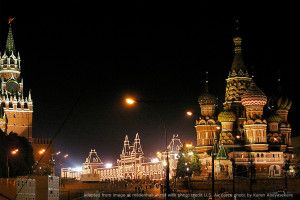Not ‘Constrained by Communism’ – Why Putin is a Greater Threat than Brezhnev Ever Was

(Paul Goble – Window on Eurasia – Staunton, June 3, 2017)
Some years ago, Toomas Hendrik Ilves, who later became president of Estonia, suggested that “if the Russians were to come back to Estonia again, they would not be constrained by communism.” That is, they would pursue an even more repressive Russian nationalist agenda there than had the Soviet Union during the occupation.
But like so many of Ilves’ pithy observations, this one was has far broader implications and involves far more than Estonia alone. Now, no longer “constrained by communism,” Vladimir Putin’s regime is a far greater threat than was its Soviet predecessor despite and even because the Russian Federation today is far weaker than was the USSR.
Some of these are rooted in the kind of policies Moscow can engage in because it is not constrained by the Marxist-Leninist ideology which was never far from the surface. Some are rooted in the collapse of the West and especially of the United States in the face of such threats. And some reflect certain unique opportunities a Putin but not a Brezhnev can exploit.
Below is a list of ten such reasons. It is not complete and is offered only as the basis for further reflection and discussion, something the West needs to engage in if it is to avoid a defeat for itself and its principles and if it is again to promote its interests and principles for a freer, more stable and more prosperous world.
1. Putin is promoting chaos rather than a specific agenda, increasing the number of potential agents and allies and limiting the ability of others to mobilize against him. No Soviet leader would have made alliances with racists, extreme nationalists or Islamists at least to the extent that Putin has done – Soviet ideology would have precluded even the exploration of such things even if the KGB promoted them.
2. Putin can and does spend money to win over such people in far greater quantities than Brezhnev ever imagined. In Soviet times, those who worked for Moscow usually had to do so for ideological reasons or because of blackmail. Now, blackmail remains but money is a far more effective tool. Direct bribes or timely investments are now the rule for the KGB officer in charge in Moscow.
3. Putin can offer the potential of enormous riches in Russia to influential businessmen who would never have dealt with a communist regime but are only too happy to deal with the one-stop shopping of a viciously authoritarian one. (For a discussion of a case of this involving a large number of US figures, see echo.msk.ru/blog/piontkovsky_a/1990592-echo/ and twitter.com/SethAbramson/status/845089192438829056.)
4. Putin gains an army of supporters whose bona fides include past anti-communism be it as advisors to Western leaders, employees of Western broadcasters or intelligence services, or even Soviet emigres. In addition, this army includes many in the academy and journalism who either want to display “balance” or need the cooperation of Moscow to advance their careers. In the past, they could rise by opposing Moscow; now they do so by promoting its interests.
5. Putin understands and uses the new media in ways Soviet leaders never dreamed of. They did not have the Internet or social media, and thus their actions were both more obvious and more easily contained. Putin knows that flooding the market has the effect of driving the discussion even if what he pours in is neither true nor in the interests of those who unwittingly accept it.
6. Because of his short time horizon – Russia is getting weaker not stronger, the exact opposite of what Soviet leaders believed to be the case – he is prepared to throw the dice in ways they were not. They were first and foremost interested in defending what they had. Putin like a shark can retain what he has only if he is moving forward. Consequently, he is prepared to launch attacks on other countries that even Brezhnev would not have done, confident that his nuclear weapons will prevent an adequate response.
7. The West has changed. It has lost its focus. When the great Soviet Americanist Georgy Arbatov came to Washington with Gorbachev in the 1980s, he remarked that Gorbachev was going to do something far more serious to the US than any of his predecessors: he was going to take away Washington’s enemy, something without which the US couldn’t function. That was a laugh line then and no one anticipated just how far Gorbachev was prepared to go. But it is no laughing matter now: without an enemy, the US and the West more generally has lost is compass.
8. Further, the West has lost its moral center. It is no longer sure of itself or of what it represents. The irresponsible labelling of Russia and other post-Soviet states as democracies or countries in transition to democracy did more harm to the West than many yet imagine. When the West stopped using language correctly, it lost the ability to see what was in front of its face.
9. And the West no longer wants to take on new commitments but to avoid them. Like British appeasers in the 1930s who wanted to avoid another Verdun, American and European leaders and intellectuals are so desperate to avoid another cold war that they will go out of their way to advance Moscow’s position even when it undermines their own.
10. Tenth and most important, Putin understands what is going on. The West doesn’t. And because it doesn’t, the Kremlin dictator is gaining victories he doesn’t deserve and the West and its allies around the world are suffering loses they should not be putting up with.
[Article also appeared at windowoneurasia2.blogspot.com/2017/06/not-constrained-by-communism-why-putin.html]
